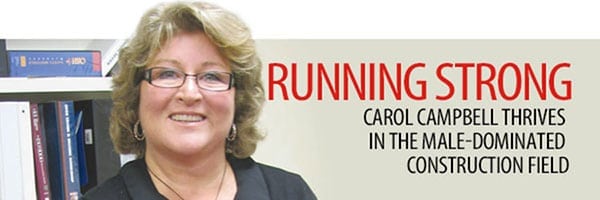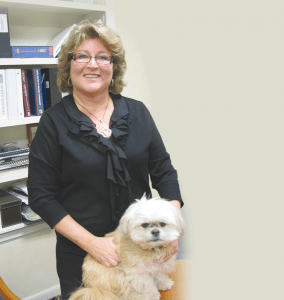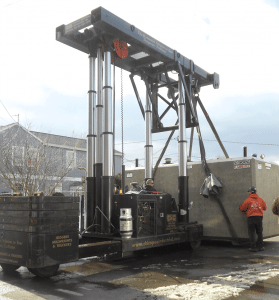
Running Strong
Carol Campbell Thrives in the Male-dominated Construction Field
 As she spoke with BusinessWest last week, Carol Campbell was preparing to head down to Walt Disney World to run in her fourth half-marathon.
As she spoke with BusinessWest last week, Carol Campbell was preparing to head down to Walt Disney World to run in her fourth half-marathon.
“I have to be competitive in business, but I’m not a good runner,” she laughed. “You’ll never see me in the top 100; my goal is to finish. But the training keeps me healthy, which allows me to do everything else I do. And it’s a good time for thinking.”
Of course, a few days in Florida in January — while much of the northern U.S. deals with something ominously called the polar vortex — isn’t a bad thing in itself. Or, as Campbell put it, “I’ll go run anywhere that’s flat and warm.”
But running isn’t the same thing as running a company, and she’s thrilled that her firm, Chicopee Industrial Contractors (CIC), has largely recovered from a very flat period that began in late 2009 and lingered through a crippling recession. “We’re good,” she said. “We’ve had better years, but I’m happy that we’re on a nice, steady incline.”
To get to this point, however, the company endured what she called the first crisis of morale in its 22-year history.
“We have had great years, and we have had OK years. Then, in 2009, I experienced something I had never seen in business — we just hit a brick wall,” Campbell said. While other types of businesses had been struggling since early 2008, CIC — whose services include rigging, millwrighting, plant and machine relocation, and structural steel installation — benefited, sadly, from a number of area plant closings.
“We were quite busy. We had a great year in 2008 and most of 2009, and then in December, I knew what everyone else was talking about.”
That began a period of downsizing and relative inactivity so severe that CIC essentially had to return to the infancy stage of its business to recover.
“We still had an infrastructure, but it had been chipped away because we had dealt with layoffs, dealt with downsizing, and lost some positions to attrition, and then, as the market started to increase, we were expected to do everything we had done before. We had the bones, but just the bones.”
And she’s not talking about the milk bones that Abigail, her 10-year-old llasa apso, snacks on when she accompanies Campbell to work every day. She’s long joked that Abigail has a role at CIC just like any other employee, even if it’s just providing stress relief through a few moments of therapeutic petting.
Hopefully the next several years will bring less stress than the last few, but if not, well, she and her team have overcome plenty of challenges before.
Moving Parts
Before launching CIC in 1992, Campbell was working as director of marketing and development for the UMass Fine Arts Center, but looking for an entrepreneurial challenge.
The recession of the early ’90s had taken a toll on various sectors of the economy, and three area rigging plants had shut down. CIC was a way to rescue many of those workers — including Campbell’s now-ex husband — and hit the ground running with a skilled team and equipment bought on the cheap.
“Some other businesses were not surviving, so there was a ready workforce for us. We were also able to get a lot of equipment at 50 cents on the dollar because of the auctions happening in the companies that closed,” she recalled. “So our entry into the market was a reasonably easy one.”
The economic landscape was still challenging, though, and Campbell faced personal trials as well, including a difficult divorce. But she gradually grew CIC’s client base to close to 1,500, with the majority of work coming form a core of a couple hundred repeat customers.

Carol Campbell says CIC’s rebound from the recession has allowed it to invest more heavily in personnel and equipment.
“We had the same customer base, but they were dealing with their own issues from the recession,” she said. “All of a sudden, price just became the number-one driver in sales — whoever could provide the best price. Also, some businesses were trying to do their own rigging in house, as opposed to taking on that extra cost.”
She said it was “many months” before CIC got to the point where it could start investing in new equipment and regrowing the business — and to start rebuilding morale.
“One of the hardest things that came from the recession — and you find a thread of this with everyone you talk to — is, when there’s such uncertainty about work, there’s a change in morale,” she told BusinessWest. “We never had issues with morale prior to this; we had always been very solid. That’s why we spend so much of our resources on our workforce, training our workforce and keeping them at the level they need to be able to perform.”
That focus on rebuilding from within, Campbell said, has helped coax CIC back onto a steady incline of growth.
“We’ve been working with a grant from the Commonwealth of Massachusetts to educate our workforce on computers — we’ve had a big difference in the level of knowledge about computers — and we’ve brought in outside facilitators and also had training from within,” she explained. “We’ve invested in a lot of new equipment, too; over the last couple of years, we’ve really increased our equipment inventory.”
Campbell repeatedly came back to the value she places on her workers — “we’ve been very fortunate, and many of our employees have stayed here many years,” she noted — partly because such a specialized field of construction faces a regional skills gap.
“We need to find programs to educate the workforce,” she said. “Having the desire to do this is not enough. You have to have experience. We do a lot of on-the-job training, but you still have to come in with years of experience.”
To that end, she’s teaming with other firms to develop more training programs in the community, as well as trying to create smoother career paths from technical schools into her industry.
“It all comes back to the same thing — we want to expand the company and offer new services, but we still need the workforce,” she said. “They say unemployment is high, but we don’t see that here.”
Growth Plans
That said, rigging, millwrighting, and CIC’s other specialties don’t tend to follow a specific business cycle, as evidenced by the flurry of plant-shutdown activity of 2008 and that figurative brick wall in late 2009. “It’s a feast-or-famine type of business,” Campbell noted.
But while the Great Recession might have changed the bar, she told BusinessWest she’s happy with where the company is right now, despite the fact that major expansion plans in Louisiana several years ago didn’t come to fruition — partly because of the difficulty penetrating a stubborn old-boys network.
“Our goal had always been to open up down south,” she said. “But we’re looking at some other opportunities up here for expanding our services. In the ’90s, everyone was, ‘do what you do best and outsource the rest.’ Now, everyone is looking for that one-stop shop. We’re pretty turnkey — from concrete and foundation installation to some structural steelwork to rigging and assembling — but we want to expand on that.”
She says being a female CEO in a male-dominated industry is neither the challenge nor benefit some might believe. Rather, what Campbell brings to the table is far more than her gender, as evidenced by an embroidered pillow in her office bearing the expression, “behind every successful woman is … herself.”
“There’s certainly no advantage to being a woman in this business,” she said. “Certainly we have all the certifications [as a woman-owned company], but I can count on one hand how many times we were hired because of those. It’s just not part of the hiring process for us. When they need our skills, they need our skills.”
And companies really do need those skills. She recalled one recent project where the client said CIC made the work look easy.
“But the next time they try it themselves, they get in trouble, and we get a last-minute call,” she said. “It’s a skill, and it’s an art. Sometimes it can be enjoyable to watch, like a ballet, watching someone set this large, awkward, heavy piece almost on a dime. I saw someone today who did not have an eighth of an inch of clearance as he moved the piece around. It’s a touch; it’s a feel.”
At the same time, she has a feel for the community around her, long making civic involvement a key part of her life.
“I feel Chicopee Industrial Contractors has an obligation to give back to the community,” said Campbell, who serves on the board and executive committee of Westmass Development, the executive board of the Women’s Fund of Western Mass., the board of Associated Industries of Mass., and the board of directors for the Chicopee Chamber of Commerce, as well as recently being invited to the Dress for Success board of directors, just to name a few activities.
“It’s a way I can give back, but I’d be foolish not to say it’s a good way to network, too,” she told BusinessWest. “There’s a good feeling of pride and self-worth in being able to use the skills and knowledge and experience that you just take for granted to help your peers, to help their organizations meet their goals.”
Bottom Line
It’s not much different, after all, than helping CIC’s clients reach their goals.
“The follow-up calls with customers are always positive,” Campbell noted. “That’s because we work hard to meet and exceed our customers’ expectations, and I think we’ll continue to do that.”
After all, running a successful business is a marathon, not a sprint. Well, a half-marathon, at least.
Joseph Bednar can be reached at [email protected]





